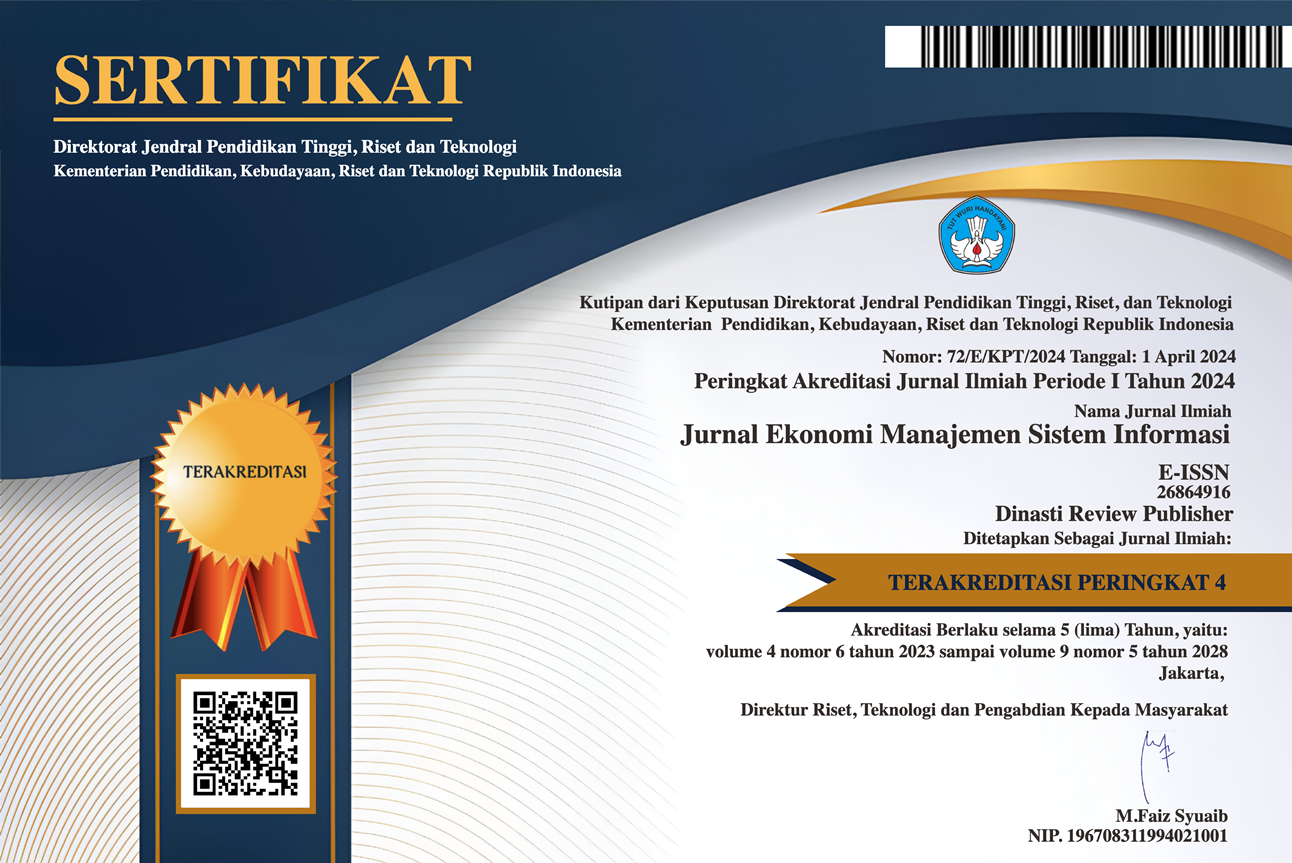The Effect of Subjective Norm, Attitude, Product Price and Product Quality on Repurchase Intention of Skincare Brand Skintific
DOI:
https://doi.org/10.38035/jemsi.v6i3.4116Keywords:
Subjective Norms, Attitudes, Product Prices, Product Quality, Repurchase IntentionsAbstract
The potential growth of the skincare industry in Indonesia makes Indonesia a competitive market, triggering manufacturers to strive to prevent customers from falling to other competitors. Retaining existing customers is the cheapest and easiest option for managers to take, because in a competitive industry it is quite difficult to acquire new customers. This study aims to examine the influence of subjective norms, attitudes, product prices and product quality on repurchase intentions. The study was conducted quantitatively on 262 users of Skintific products from workers working in Jabodetabek. The results showed that subjective norms, product prices and product quality were able to significantly and positively influence repurchase intentions, but product quality was not able to significantly influence repurchase intentions.
References
Aghitsni, W. I., & Busyra, N. (2022). Pengaruh Kualitas Produk Terhadap Keputusan Pembelian Kendaraan Bermotor Di Kota Bogor. Jurnal Ilmiah Manajemen, Ekonomi, & Akuntansi (MEA), 6(3), 38–51. https://doi.org/10.31955/mea.v6i3.2271
Boon, L. K., Fern, Y. S., & Chee, L. H. (2020). Generation Y’s Purchase Intention towards Natural Skincare Products: A PLS-SEM Analysis. An International Journal , 12(1), 61–77.
Dayani, A., Agung Kresnamurti Rivai, & Shandy Aditya. (2022). The Impact of E-Service Quality and Brand Trust on Repurchase Intention with Customer Satisfaction as Intervening for Telemedicine Application Users. Jurnal Dinamika Manajemen Dan Bisnis, 5(2), 35–56. https://doi.org/10.21009/jdmb.05.2.3
Endit, Nikita Puspita Ing. (2022). Peluang Pasar: Produk Kecantikan dan Perawatan. https://ukmindonesia.id/baca-deskripsi-posts/peluang-pasar-produk-kecantikan-dan-perawatan/
Efendi, F. B., & Aminah, S. (2023). Pengaruh Promosi dan Kualitas Produk terhadap Keputusan Pembelian Produk Skincare Skintific (Studi pada Mahasiswa UPN “Veteran” Jawa Timur). J-MAS (Jurnal Manajemen Dan Sains), 8(1), 762. https://doi.org/10.33087/jmas.v8i1.1055
Govindaraj, M. (2023). Influence of Product Quality on Perceived Value, Trust and Purchase Intention: a Study on Electronic Products. Academy of Marketing Studies Journal, 27(6), 1–12.
Hair, J. F., M. Hult, G. T., M. Ringle, C., Sarstedt, & Marko. (2022). A Primer on Partial Least Squares Structural Equation Modeling (PLS-SEM) [3 ed]. In Angewandte Chemie International Edition, 6(11), 951–952. (Vol. 3, Issue 1). https://medium.com/@arifwicaksanaa/pengertian-use-case-a7e576e1b6bf
Hati, S. R. H., Zulianti, I., Achyar, A., & Safira, A. (2021). Perceptions of nutritional value, sensory appeal, and price influencing customer intention to purchase frozen beef: Evidence from Indonesia. Meat Science, 172(April 2019), 108306. https://doi.org/10.1016/j.meatsci.2020.108306
Ikhsan, M. A., & Wulandari, R. (2024). Impact of attitude, subjective norms, and perceived behavioural control on intention to invest in retail green sukuk among Muslim millennials in Jabodetabek. Journal of Islamic Economics Lariba, 10(1), 149–168. https://doi.org/10.20885/jielariba.vol10.iss1.art9
Iqbal, S., & Safrin, F. A. (2023). The Effect Of Customer Experience And Price On Repurchase Intention (A Study on Manor Studio’s Coffee Shop Customers). Simangunsong?: Journal Of Business Administration Management, Economic And Accounting, 01(01), 17–29.
Irawati, Z., Saputro, E. P., & Setyaningrum, D. P. (2022). Counterfeit Products?: Does Experience Affect Repurchase Intention Produk Palsu?: Apakah Pengalaman Berpengaruh Terhadap Niat Pembelian Ulang.
Jain, S., Khan, M. N., & Mishra, S. (2015). Understanding consumer behavior regarding luxury fashion goods in India based on the theory of planned behavior For Authors Understanding consumer behavior regarding luxury fashion goods in India based on the theory of planned behavior. In Journal of Asia Business Studies Journal of Consumer Marketing Journal of Product & Brand Management (Vol. 11, Issue 3).
Johari, C., & Keni, K. (2022). Pengaruh Product Quality, Attitude of Customers Dan Perceived Behavioral Control Terhadap Purchase Intention Pada Umkm Produk Kue. Jurnal Muara Ilmu Ekonomi Dan Bisnis, 6(2), 340–351. https://doi.org/10.24912/jmieb.v6i2.21215
Kevin, L., & Tjokrosaputro, M. (2021). Pengaruh Perceived Price Dan Country Of Origin Terhadap Repurchase Intention Merek Minuman Xing Fu Tang Di Jakarta: Word Of Mouth Sebagai Variabel Mediasi. Jurnal Manajerial Dan Kewirausahaan, 3(1), 52. https://doi.org/10.24912/jmk.v3i1.11287
Kusumawardani, K., & Purniasari, P. (2021). The Effect of Online Consumer Interaction and Shopping Motivation on Purchase Intention. FIRM Journal of Management Studies, 6(2), 183. https://doi.org/10.33021/firm.v6i2.1555
Majeed, M., Asare, C., Fatawu, A., & Abubakari, A. (2022). An analysis of the effects of customer satisfaction and engagement on social media on repurchase intention in the hospitality industry. Cogent Business and Management, 9(1). https://doi.org/10.1080/23311975.2022.2028331
Mandili, I., Zarkasih, A., Munthe, R. S., & Wahyuni, E. (2022). Effect of Product Quality, Customer Satisfaction, Trust, and Brand Image on Repurchase Intention. Case Study: Halal Cosmetic Products. Budapest International Research and Critics Institute-Journal, 5(2), 10802–10809.
Natami, N. M. A. D., & Muliartha, K. (2019). Pengaruh Sikap dan Motivasi terhadap Minat Mahasiswa untuk Mengikuti Pendidikan Profesi Akuntan (PPAk). 27, 1678–1702.
Phan Tan, L., & Le, T. H. (2023). the Influence of Perceived Price and Quality of Delivery on Online Repeat Purchase Intention: the Evidence From Vietnamese Purchasers. Cogent Business and Management, 10(1). https://doi.org/10.1080/23311975.2023.2173838
Prayoga, R. F., Setiawan, M., & Rohman, F. (2018). The effect of attitude, subjective norm and behavioral control on decision repurchase intention via intent (a study on services company PT. Global Insight Utama Bali area). Management and Economic Journal (MEC-J), 2(3), 279–292. https://doi.org/10.18860/mec-j.v0i0.5318
Sadya, Sarnita. (2022). Sebanyak 45% masyarakat Indonesia Beli Skincare Sebulan Sekali. https://dataindonesia.id/gaya-hidup/detail/sebanyak-45-masyarakat- indonesia-beli-skincare-sebulan-sekali
Sudirjo, F., Yani, I., Hernawan, M. A., Rukmana, A. Y., & Nasution, M. A. (2023). Analysis of the Influence of Product Features , Price Perception , Brand and Customer Experience on Repurchase Intention of Smartphone Product. INNOVATIVE: Journal Of Social Science Research, 3(3), 3225–3233.
Sumaryono, & Sukanti. (2016). FAKTOR-FAKTOR YANG MEMPENGARUHI NIAT MAHASISWA ACCOUNTANT THE FACTORS THAT AFFECTING STUDENT ’ S INTENTION TO TAKE CA. Jurnal Profita Edisi 7, 4, 1–20.
Suttikun, C., & Meeprom, S. (2021). Examining the effect of perceived quality of authentic souvenir product, perceived value, and satisfaction on customer loyalty. Cogent Business and Management, 8(1). https://doi.org/10.1080/23311975.2021.1976468
Suzuki, W., Chaipoopirutana, S., & Combs, H. (2019). An Examination of Factors Influencing Repurchase Intention Towards a Fashion Brand in Thailand. AtMA 2019 Proceedings, 154–171.
Udhayakumari, T. R., & Anandanatarajan, K. (2020). Relationship Between Subjective Norms on Purchase Intention of Organic Food?: a Study With Chennai Consumers. Journal of Xi’an Shiyou University, Natural Science Edition, 18(5), 137–146.
Upamannyu, N. K., Gulati, C., Chack, A., & Kaur, G. (2015). The effect of customer trust on customer loyalty and repurchase intention: The moderating influence of perceived CSR. International Journal of Research in IT, Management and Engineering, 5(4), 1–31.
Downloads
Published
How to Cite
Issue
Section
License
Copyright (c) 2025 Yulisa Halim Wijaya, Margaretha Pink Berlianto

This work is licensed under a Creative Commons Attribution 4.0 International License.
Hak cipta :
Penulis yang mempublikasikan manuskripnya di jurnal ini menyetujui ketentuan berikut:
- Hak cipta pada setiap artikel adalah milik penulis.
- Penulis mengakui bahwa Jurnal Ekonomi Manajemen Sistem Informasi (JEMSI) berhak menjadi yang pertama menerbitkan dengan lisensi Creative Commons Attribution 4.0 International (Attribution 4.0 International CC BY 4.0) .
- Penulis dapat mengirimkan artikel secara terpisah, mengatur distribusi non-eksklusif manuskrip yang telah diterbitkan dalam jurnal ini ke versi lain (misalnya, dikirim ke repositori institusi penulis, publikasi ke dalam buku, dll.), dengan mengakui bahwa manuskrip telah diterbitkan pertama kali di Jurnal Ekonomi Manajemen Sistem Informasi (JEMSI).










































































